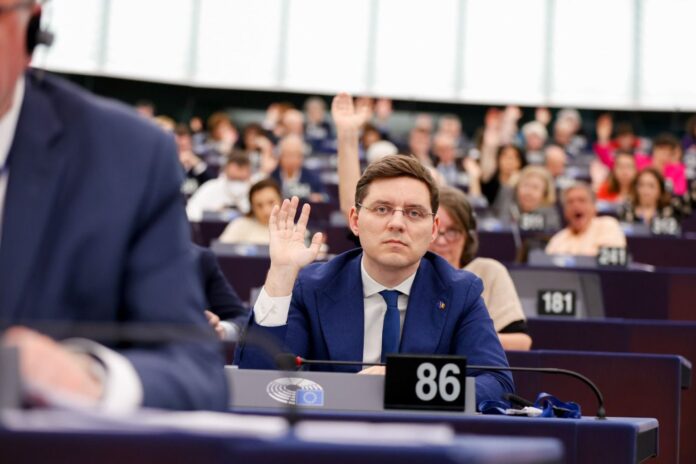Digital transformation must be a national project, given that nine out of ten people use digital tools today, but only two out of ten really know how to use these technologies in a useful manner, including in the professional component, said on Friday the Vice President of the European Parliament, Victor Negrescu, at the D-TECH Forum.
„Even though 9 out of 10 people today use digital tools, unfortunately approximately 2 out of 10 people really know how to use these technologies in a useful manner, including in the professional component. Which means that 8 out of 10 are left behind, 8 out of 10 Romanians are not keeping up. 8 out of 10 Romanians do not have the necessary skills to use these tools in a manner that would give them an extra chance, including for a better job. Therefore, we must also consider the risks that this represents,” said Negrescu.
The EP Vice-President drew attention to the fact that the digital revolution also comes with risks, which is why he asked the European Commission to allocate 30% of the future European Competitiveness Fund to this area of digital transformation.
„The digital revolution also comes with risks. We have been through these moments, with cyber attacks. You have probably noticed in public communications attacks on electoral infrastructure, the fact that we have had tens of thousands of cyber attacks on public institutions, the fact that even now companies in the private sector have difficulties in protecting our data and we regularly hear communications regarding the theft of personal data. Much more is needed and much faster. That is why, together with relevant actors from the European Parliament, we have requested the European Commission that 30% of the future European Competitiveness Fund go towards this digital transformation area. Let us maintain this subject as a priority, alongside the defense component and the competitiveness component, because it is obvious that the cyber area, the digital area define and influence the two pillars that will make them the central elements of European policy in the future. So, we are not just talking about speed, we are also talking about „safety, because the keyboard, today, seems to be slowly becoming, I’m saying it harshly, even a weapon, so whoever doesn’t defend themselves, whoever doesn’t have the mechanisms to defend themselves, may lose,” the Romanian MEP said.
In his opinion, digital transformation must be inclusive, because it would be complicated to continue living in a Romania, or Europe, divided between those who understand this system and those who cannot operate properly with digital technology.
„I would like to emphasize that digital transformation must, in my opinion, be inclusive. It is a key concept, but for me it means much better, because it would be complicated to continue living in a divided Romania, in a Europe divided between those who understand this system and those who cannot operate properly with digital technology. You have probably seen the fake news that has been circulating about the proposal that the EU made regarding the creation of a digital driving license or regarding the creation of a digital passport, that is, a platform where you can upload all your documents so as not to lose them, documents that will be officially recognized. You have seen on the internet, especially in Romania, but not only in Romania, how people were misled, citizens were told that our data would be stolen, that someone wants to have access to personal data, that Europe wants to control us. Nothing more false, but this information circulated and even generated political reactions. So digitalization without equity can become a new form of exclusion and we cannot forget or ignore this,” Victor Negrescu pointed out.
In this context, the EP official believes that digital transformation must be a national project, perhaps even a future project for Europe.
„I believe that digital transformation should not be just a technical project. I believe that digital transformation should be a national project, maybe even a future project for Europe. We all need to work together, both in the public and private sectors. We have a responsibility not to miss the train and to ensure that Romania is truly a European digital hub, a place where ideas are transformed into innovations, where every young person has access to digital skills, where data is protected, not just exploited, where the state does not just digitize papers, but rethinks its function in the digital age. So the future is now. I believe in digital Romania, I believe in a Romania that innovates, that defends itself and that matters for Europe, and for that we do not just need technology, we certainly need courage, leadership, action and such formats that allow us to „Let’s dialogue and build the works,” he added.
The first edition of the D-Tech Forum 2025 in Bucharest, a regional summit that aims to align visions on digitalization and cybersecurity in the context of the European Competitiveness Plan, takes place on Friday at the headquarters of the National Bank of Romania. The event is attended, among others, by the Vice President of the European Parliament, Victor Negrescu.
Also participating in the forum are the Minister of Health, Alexandru Rafila, and representatives of Romanian institutions responsible for digitalization and cybersecurity, along with top personalities from the private sector, as well as cybersecurity experts from other countries in the region.
According to the organizers, some of the topics proposed for debate are ensuring democratic access to society and digital services, AI applications in the automation of digital services, applications for 5G/6G networks and technology, universal access to electronic payments, ensuring privacy versus the fight against terrorism, regulating cybersecurity, the human factor in assessing cyber risks, but also more technical ones such as mobile device security or protecting equipment in IoT.
AGERPRES




